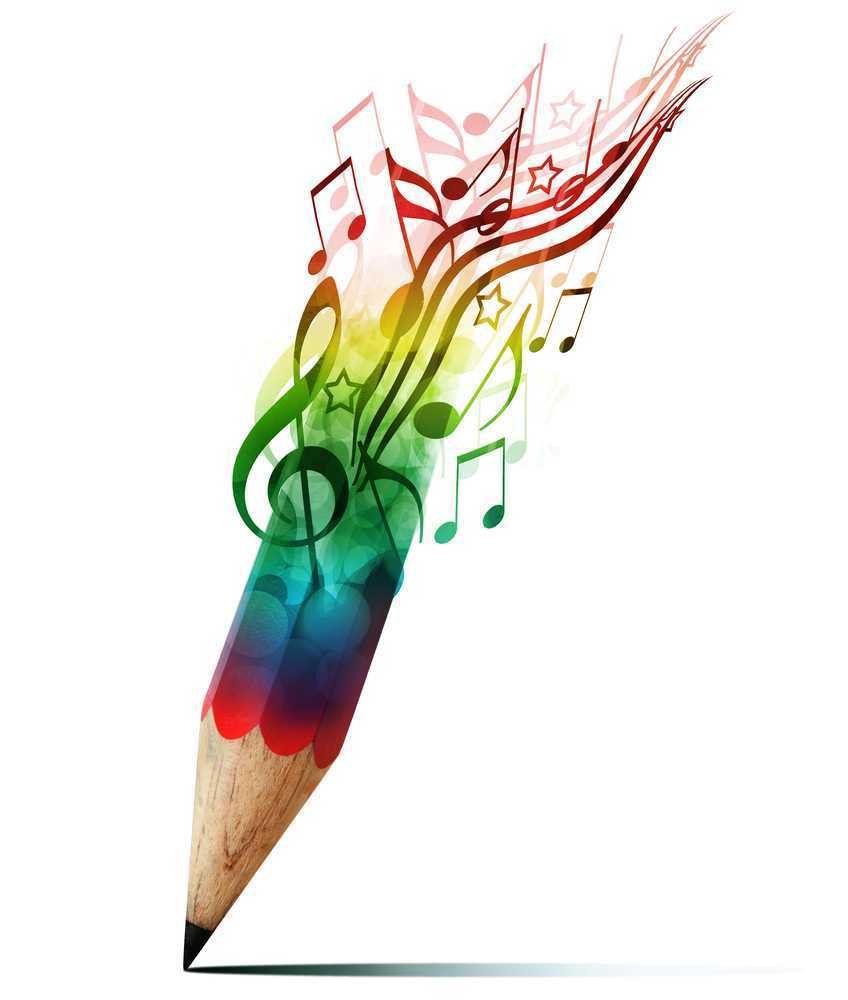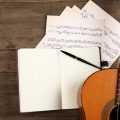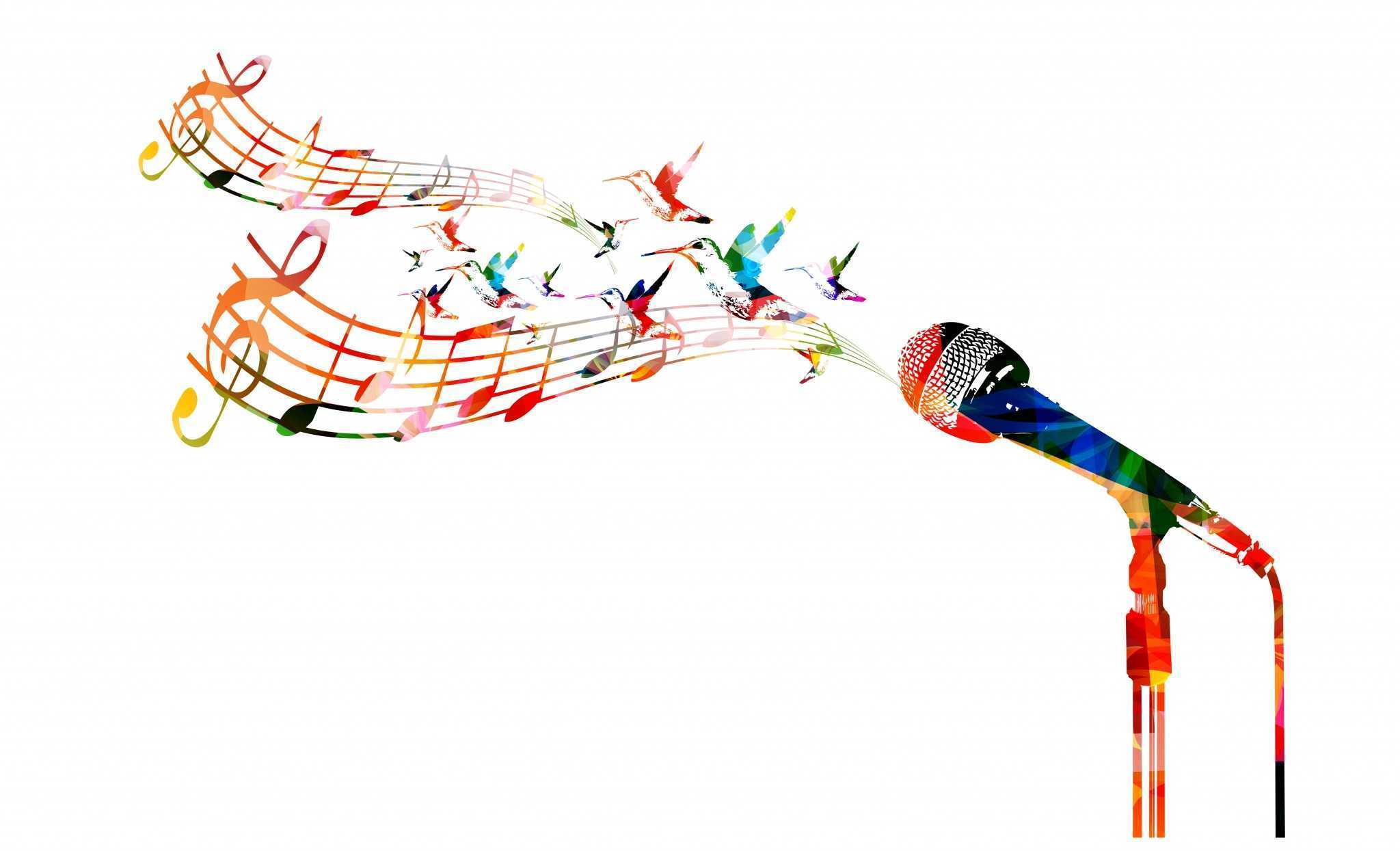What is it about the seemingly simple task of writing a song that stumps even the most confident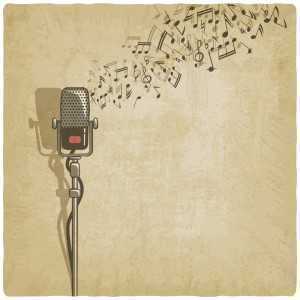 and skilled musicians? A talent for writing memorable melodies and thoughtful chord progressions seems to be indifferent to a musician’s training and skill level. A person who has played an instrument for a few months is as likely to write a song just as interesting and compelling as someone who has played an instrument for decades. Why is this?
and skilled musicians? A talent for writing memorable melodies and thoughtful chord progressions seems to be indifferent to a musician’s training and skill level. A person who has played an instrument for a few months is as likely to write a song just as interesting and compelling as someone who has played an instrument for decades. Why is this?
I’ve taught guitar, piano and songwriting professionally for nearly a decade and I still ask myself this question. “How do you, uh, write a really good song?”, my 13 year old guitar student asked me last week. That’s a loaded question. After writing about 100 songs I’m still not sure I know the answer. I’ve written music for a major Hollywood movie, performed at SXSW and the CMJ Music Marathon, supported acts like Imagine Dragons, Sharon Van Etten and The Joy Formidable and was named a finalist in the prestigious International Songwriting Competition (ISC) two years in a row, but every time I sit down with the intention of creating a new piece of music, I feel the same familiar thing: uncertainty, a little dread and an intense sense of wonder and possibility.
There are common-sense exercises and tools out there for people interested in learning how to write a song. You don’t need to be a virtuoso musician to be a successful songwriter, but, (in my opinion) knowing how to play at least a few chords is hugely helpful in the process of constructing a song from the ground up and really knowing your way around a musical idea. Software like GarageBand is great for folks who don’t know how to play an instrument, as long as you’re creating and arranging original music (in other words, please avoid the temptation to call one of Garage Band’s pre-recorded loops your own original music).
What Makes a Song Successful?
If you want to write a compelling song, you might want to think about what makes a song great in the first place. For the sake of simplicity, let’s define a song as anything that has a vocal melody  placed over a chord progression. A chord progression is just a series of chords that change and repeat, by the way. Start listening to music critically and begin working towards being able to identify the melody and form in the songs you love.
placed over a chord progression. A chord progression is just a series of chords that change and repeat, by the way. Start listening to music critically and begin working towards being able to identify the melody and form in the songs you love.
Attributes like catchy hooks, interesting lyrical narratives and engaging chord progressions make songs worth listening to, but at the end of the day tension reigns supreme. A song that is able to showcase and sustain emotional tension is successful in my book. Any sort of honest tension–musical or lyrical–will add life and a narrative to a song. Movies need plotlines, characters need purpose and music needs tension. If all this tension stuff sounds a little abstract and difficult to pin down, don’t worry. We’re going to start with some super-simple methods to help you learn how to write a song. For now, forget all about that tension stuff.
Set and Stick To Goals
Want to write a song? Then the most important thing–and I can’t stress this enough–is to create serious tangible goals and follow through with them. “This week I will write a verse and a chorus for my new song”, or “By the end of this month, I will record a demo of my new song”, are good examples. Make realistic goals, hold yourself accountable and work consistently. Writing music is difficult, detailed work. There’s a popular misconception about songwriting where people believe that great songs just bestow themselves upon the songwriter without effort and work. This couldn’t be further from the truth. Yes, inspiration and ideas will come to you (sometimes in unexpected ways), but you have to be available to receive them and translate energy and ideas into actual songs. Making the time to sit down with your instrument is the only way you’ll ever write a song. Goal #1 should be to create space and time to engage in the process of songwriting. This time should be focused, unrushed and completely dedicated to making music.
Create a Songwriting Schedule
If you’re struggling to find the motivation to write your first song, I recommend writing a schedule. Assuming you don’t work 65 hours a week, if you commit yourself you should be able to write and record a demo of your song in two weekends. Here’s a generic songwriting schedule you could write for yourself:
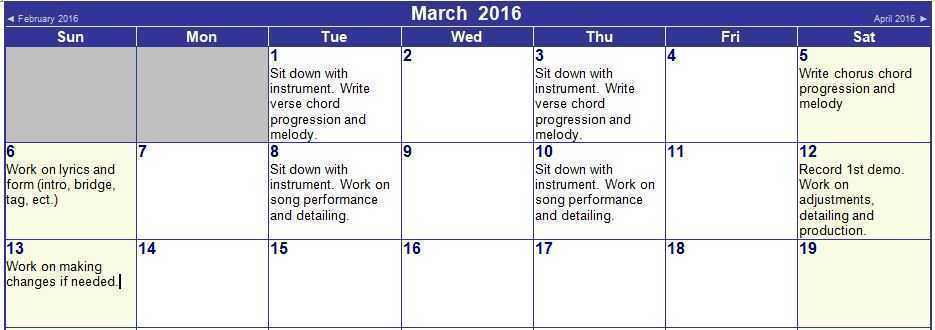
Obviously, this is just a generic schedule for how to write a song, but if you’re the type of person that needs accountability, creating something like this might be really beneficial for you. Again, the important thing here is that you’re making tangible and realistic songwriting goals. My songwriting schedule example spans two weeks, but for you the process might be longer or shorter. Adjust accordingly.
Leave Emotion Out of It (For Now)
Good songwriting involves a great deal of honesty and vulnerability, but I think you should try leaving that all out of your first few songs. Here’s why. Writing a song, especially if it’s your first 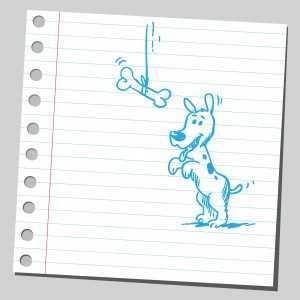 song, can be a terribly intimidating experience, and a lot of people can’t bring themselves to even try because they’re afraid of failing. So, here’s what you should do: See your first efforts at songwriting as exercises rather than grandiose artistic statements. Do your best to leave emotion, expectation and doubt out of your first few songs. Lofty expectations combined with impatience and inexperience tend to create working conditions that can choke creativity and discourage learning how to write a song. The important thing in the beginning of your songwriting practice is that you produce something. Lyrics scrawled down on a napkin and stray choruses recorded on your iPhone are welcome. Write silly joke songs about your dog or what you’re cooking for dinner. The less serious the better. These aren’t songs that define you and your artistry. These are simple exercises to get you comfortable with setting words to music.
song, can be a terribly intimidating experience, and a lot of people can’t bring themselves to even try because they’re afraid of failing. So, here’s what you should do: See your first efforts at songwriting as exercises rather than grandiose artistic statements. Do your best to leave emotion, expectation and doubt out of your first few songs. Lofty expectations combined with impatience and inexperience tend to create working conditions that can choke creativity and discourage learning how to write a song. The important thing in the beginning of your songwriting practice is that you produce something. Lyrics scrawled down on a napkin and stray choruses recorded on your iPhone are welcome. Write silly joke songs about your dog or what you’re cooking for dinner. The less serious the better. These aren’t songs that define you and your artistry. These are simple exercises to get you comfortable with setting words to music.
Chord Progressions
Everyone’s songwriting process is bound to be different, but I normally gravitate toward beginning the process with building chord progressions. The type of chords you choose and how you decide to present them will determine a great deal about the song you’re writing. If we think of a song like a house, the chord progression is going to be the foundation. Melody gets all the love and attention, but it wouldn’t even exist without a thoughtful chord progression.
If you’re new to the songwriting game, I recommend starting with a few simple chords. G, C and E minor is a good place to start. Take out your instrument and toy around with playing different combinations of these 3 chords. After time, you might find that you favor one combination, feel or pattern over other ones. Take that idea, write it down and run with it. Don’t feel like you have to come up with chords for the entire song right now. From my experience, writing a decent chord progression will help set the tone and feel of the rest of the song.
Melody
This is where it’s going to get tricky for a lot of folks. Writing melodies is a skill that seems to elude a lot of musicians, and I have a theory about why. To write a good melody, you’re going to need to get comfortable with the idea of singing half-baked ideas out loud. Understandably, this makes lots of people uncomfortable. This is why I recommend that you not take yourself seriously when  you write your first couple of songs. Singing about something funny, mundane or unimportant will prove to be easier to do more than singing about important emotional topics. These are songwriting exercises, and the less pressure you put on yourself during this process the better.
you write your first couple of songs. Singing about something funny, mundane or unimportant will prove to be easier to do more than singing about important emotional topics. These are songwriting exercises, and the less pressure you put on yourself during this process the better.
With your instrument, begin playing the chord progression you’ve selected over and over again. Then, begin to hum ideas over the chords. Recording yourself during this process to help you remember good melodic ideas is a smart thing to do here. During this stage in my songwriting process, I find that I sing a whole lot of gibberish in the beginning, but after a while I move toward clear-cut ideas. The process here will probably be different for you, but this is how it works for me. It’s a good idea to have a few lyrics written out before you begin writing melodies, but it’s not at all required. In fact, most of the time I have no lyrics, ideas or pre-conceived notions of what I want a song to sound like before I sit down and begin singing. Catchy melodies weave themselves into my songs when I create the appropriate conditions (dedicated songwriting time and space) for them to happen.
Vocal Phrasing
This might be a bit controversial, but I believe that vocal phrasing is as important as the contour of a melody. The way you choose to rhythmically set your melodies over chord progressions has a big role to play in how catchy and memorable your song will be. There’s no right or wrong way to phrase lyrics, but employing syncopation is a good way to liven up the melody and make it more interesting. Syncopation happens when you emphasize weak beats, by the way. The chorus of Styx’s “Mr. Roboto” is a great example of catchy syncopated vocal phrasing. Tool around with beginning and ending melodies on any beat other than the 1 when it’s time to write your vocal melody.
The first melodies you write might be rough around the edges, but that’s perfectly fine. Don’t thwart your songwriting practice by expecting too much out of the first few efforts. Like all other aspects of songwriting, your ability to construct poignant and thoughtful melodies will only grow and develop with more practice.
Form
Once you’ve nailed down a verse chord progression and melody for your song, it’s time to think about form. There’s a million ways to go about constructing the form of a song, but the most standard form of a pop song is some iteration of verse/chorus/verse/chorus. By the way, “pop” is not a bad word. I’m not saying pop as in Katy Perry or Justin Bieber pop here, but instead the artform of basic pop or popular songwriting. How you decide to go about the form for your song is up to you. Maybe you’ll feel inspired to write a short intro with a completely different chord structure that segways into your first verse. Or perhaps a simple verse/chorus/verse/chorus/bridge/chorus will work best for you. Anything you decide to do is ok, but keeping simplicity in mind for these first few songs is really important.
The Demo
Once you’ve finished writing your first song, take the time out to record a demo. Recording a simple version of your song is hugely important. A demo can tell you everything you need to know about your song and how you can make it better. It crystallizes all the work you’ve put into your songwriting practice, and it opens the door for possibilities of further production and ideas. Having a simple demo of your song will help tell you what needs to be done to improve the music you’re trying to write. You might listen back and think, “It would be cool if this verse section had some swelling guitars”, or, “This song feels a bit boring and it needs one less verse.” Demos tell us what our songs sound like and what we need to do next. The Apple software program Garage Band is incredibly easy to use and there’s a lot of cool effects you can use to make your demos sound interesting, but you can record simple demos on your phone or even a tape recorder. The important thing is that you make some sort of sonic record your song.
Keep Writing
Like I mentioned before, songwriting is incredibly hard work, and you should expect a lot of frustration and uncertainty in your practice if you ever decide to take it seriously.
Take some time and ask yourself what it is you expect to get out of writing music. Your intention might just be the thing that sustains you through the ups and downs of songwriting. Practice will make you better, but there’s never a guarantee that your efforts will get what you want if your intention is to make money or to attain notoriety or acclaim from writing songs. If you love writing music, then the process of writing a song will be more than enough of a reward in itself.


